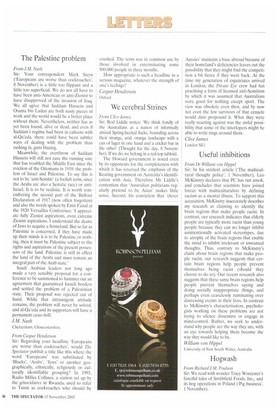The Palestine problem
From J.M. Nash Sir: Your correspondent Mark Steyn ('Europeans are worse than cockroaches', 8 November) is a little too flippant and a little too superficial. We do not all have to have been anti-American or anti-Zionist to have disapproved of the invasion of Iraq. We all agree that Saddam Hussein and Osama bin Laden are both nasty pieces of work and the world would be a better place without them. Nevertheless, neither has as yet been found, alive or dead, and even if Saddam's regime had been in cahoots with al-Qa'eda, there could have been subtler ways of dealing with the problem than rushing in, guns blazing.
Meanwhile, the overthrow of Saddam Hussein will still not cure the running sore that has troubled the Middle East since the eviction of the Ottomans in 1918: the problem of Israel and Palestine. To say this is not to be 'anti-Semitic' (a foolish term, since the Arabs are also a Semitic race) or antiIsrael. It is to be realistic. It is worth remembering the second part of the Balfour Declaration of 1917 (now often forgotten) and also the words spoken by Emir Faisal at the 1920 Versailles Conference: 'I appreciate fully Zionist aspirations, even extreme Zionist aspirations. I understand the desire of Jews to acquire a homeland. But so far as Palestine is concerned, if they have made up their minds it is to be Palestine or nothing, then it must be Palestine subject to the rights and aspirations of the present possessors of the land. Palestine is still in effect the land of the Arabs and must remain an integral part of the Arab state.'
Saudi Arabian leaders not long ago made a very sensible proposal for a conference to be summoned to hammer out an agreement that guaranteed Israeli borders and settled the problem of a Palestinian state. Their proposal was rejected out of hand. While that intransigent attitude remains, the problem will never be solved, and al-Qa'eda and its supporters will have a permanent casus belli.
J. M. Nash
Cheltenham, Gloucestershire
From Caspar Henderson Sir: Regarding your headline 'Europeans are worse than cockroaches', would The Spectator publish a title like this where the word 'Europeans' was substituted by 'Blacks', 'Arabs', 'Jews' or another geographically, ethnically, religiously or culturally identifiable grouping? In 1993, Radio Milles Collines, a station set up by the genocidaires in Rwanda, used to refer to Tutsis as cockroaches who should be crushed. The term was in common use by those involved in exterminating some 800,000 people in three months.
How appropriate is such a headline in a serious magazine, whatever the strength of one's feelings?
Caspar Henderson
Oxford


























































































 Previous page
Previous page